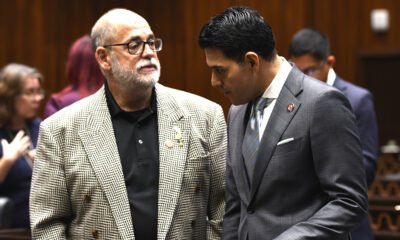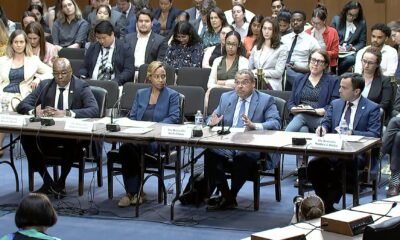"Remain in Mexico'' policy
Petersen Declares Trump Win Shifts Arizona’s Prop 314 Enforcement Path

In the wake of President Trump’s election and a Republican-led Congress, Arizona’s Senate President Warren Petersen has indicated that the state is unlikely to enforce the recently approved Proposition 314. This measure aimed to empower state and local authorities to apprehend individuals crossing the border illegally.
Petersen articulated that the fundamental intent behind Proposition 314 was to fill the enforcement void he claimed existed under the previous administration. “We literally mirrored federal law,” he stated to Capitol Media Services, underscoring the similarities between the state measure and existing federal regulations.
He continued by contrasting the Trump administration’s approach to immigration with that of Biden. “Biden was not enforcing the law,” Petersen declared, adding that Trump’s leadership will likely shift the enforcement dynamic. He emphasized that Arizona’s law enforcement agencies have numerous other criminal activities to focus on without needing to target migrants specifically.
According to estimates from the Grand Canyon Institute, enforcing Proposition 314 could impose an annual cost of approximately $325 million on Arizona’s taxpayers for incarcerating undocumented individuals. Petersen pointed out that with federal enforcement expected under Trump, the necessity for state intervention diminished.
Despite the voters approving the measure by a 3-2 margin, Proposition 314 could not be enacted immediately, as it had been modeled after legislation in Texas that faced legal challenges. A federal appeals court had halted the implementation of SB 4, asserting that it infringed on the federal government’s exclusive authority over immigration matters.
Proposition 314 was drafted to take effect only after a definitive court ruling that upheld SB 4, making its eventual enforcement contingent upon complex legal developments. Petersen described the situation as “academic” now that federal enforcement is anticipated.
Nevertheless, certain provisions within Proposition 314 continue to hold significance. For instance, one stipulation mandates state agencies to verify the immigration status of individuals applying for public benefits. Another provision criminalizes the submission of false information to employers regarding immigration status.
Additionally, the measure includes enhancements to penalties for the sale of fentanyl, reflecting concerns over narcotics crossing the border. Petersen noted, “You’ve got stronger fentanyl penalties now. That’s a state crime and this is where it should be handled.”
Despite the measure’s focus on local involvement in immigration enforcement, it was emphasized during its campaign as a way for the state to address ongoing challenges at the border. “This obviously frees up law enforcement so they can shift their priorities,” Petersen remarked.
The approval of Proposition 314 coincided with Trump’s electoral success, where he garnered over 53% of the vote in Arizona. His campaign promises included not only border security but also the deportation of millions of undocumented individuals.
The immigration issue gained further prominence when President Biden rescinded Trump’s “Remain in Mexico” policy shortly after taking office, which had previously forced many asylum seekers to wait in Mexico while their cases were processed. This shift led to increased instances of migrants crossing the border illegally.
In response to rising public sentiment regarding open border policies, Biden took steps to limit asylum requests during high-encounter periods at the border. This response did not alleviate the political tensions surrounding immigration, a contentious issue utilized effectively by Republican lawmakers.
Initial efforts to allow state police to detain undocumented migrants were vetoed by Governor Hobbs, who recognized the frustration among Arizonans but argued that the proposed legislation was not a viable solution. Subsequently, GOP legislators opted for a ballot measure to bypass the governor’s veto.
Petersen asserts that the approval of Proposition 314 should not be considered a mistake even with Trump’s victory. He views it as a resource for potential future scenarios where federal enforcement may falter again, indicating a mixed legislative strategy moving forward.
“What they needed was to enforce existing laws,” he criticized the previous administration’s approach, raising concerns about whether sufficient resources exist within the Border Patrol to manage the situation effectively. A recent audit indicated that 88% of border stations reported being understaffed.
Despite these challenges, Petersen expressed confidence in the Trump administration’s commitment to law enforcement, stating, “He said there’s no price tag on it.” With the forthcoming changes, some individuals are reportedly self-deporting, suggesting that the anticipated enforcement may already be influencing migration patterns.


















